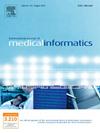从医学生和住院医师的视角看网络专业:焦点小组研究
IF 3.7
2区 医学
Q2 COMPUTER SCIENCE, INFORMATION SYSTEMS
International Journal of Medical Informatics
Pub Date : 2025-03-13
DOI:10.1016/j.ijmedinf.2025.105879
引用次数: 0
摘要
社交媒体影响医疗保健专业人员的实践。现有关于网络专业主义与社交媒体的研究较少,且多采用基于调查的方法。本质性研究探讨医学生和住院医师在医疗保健方面的线上专业精神,并绘制他们感知到的教育需求图。方法于2019年9月至2021年6月进行半结构化焦点小组访谈,探讨荷兰医学生和住院医生对网络专业精神的看法。访谈由两名研究人员进行记录、转录和主题分析,并进行迭代和独立。结果对24名医学生和22名住院医师进行了7次1小时的焦点小组调查。社交媒体上出现了针对学生和住院医生的耐心请求,但都没有被接受。在社交媒体上发现患者隐私被泄露后,同行们往往会相互举报。与会者表示,需要明确社交媒体使用的“灰色地带”,即难以区分对与错的地方。社交媒体的使用在参与者中很普遍,患者针对学生和住院医生的要求确实发生了。除非涉及到患者隐私泄露,否则他们不太可能向同行谈论网络专业素养的缺失。教育工作者应注重在本科生和研究生培养中加强对社交媒体的专业使用。本文章由计算机程序翻译,如有差异,请以英文原文为准。
Online professionalism through the lens of medical students and residents: A focus group study
Purpose
Social media influences the practice of healthcare professionals. Existing studies on online professionalism and social media are scarce, and most used survey-based methods. This qualitative study explores online professionalism in healthcare among medical students and residents and maps their perceived educational needs.
Method
Semi-structured focus group interviews were conducted between September 2019 and June 2021 to explore the perceptions of online professionalism among Dutch medical students and residents. Interviews were recorded, transcribed, and thematically analyzed iteratively and independently by two researchers.
Results
Seven one-hour focus groups were conducted among 24 medical students and 22 residents. Patient requests from social media directed at students and residents occurred, none were accepted. Upon patient confidentiality breaches on social media, peers tended to speak up to one another. Participants voiced that clarity about the ‘grey areas’ − where distinguishing between right and wrong is difficult − of social media use is needed.
Conclusions
Social media use was widespread among participants and patients’ requests directed at students and residents did occur. They were unlikely to speak about online professionalism lapses to their peers unless a breach of patient confidentiality is involved. Educators should focus on enhancing the professional use of social media in both undergraduate and postgraduate training.
求助全文
通过发布文献求助,成功后即可免费获取论文全文。
去求助
来源期刊

International Journal of Medical Informatics
医学-计算机:信息系统
CiteScore
8.90
自引率
4.10%
发文量
217
审稿时长
42 days
期刊介绍:
International Journal of Medical Informatics provides an international medium for dissemination of original results and interpretative reviews concerning the field of medical informatics. The Journal emphasizes the evaluation of systems in healthcare settings.
The scope of journal covers:
Information systems, including national or international registration systems, hospital information systems, departmental and/or physician''s office systems, document handling systems, electronic medical record systems, standardization, systems integration etc.;
Computer-aided medical decision support systems using heuristic, algorithmic and/or statistical methods as exemplified in decision theory, protocol development, artificial intelligence, etc.
Educational computer based programs pertaining to medical informatics or medicine in general;
Organizational, economic, social, clinical impact, ethical and cost-benefit aspects of IT applications in health care.
 求助内容:
求助内容: 应助结果提醒方式:
应助结果提醒方式:


